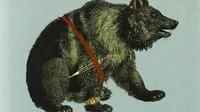RUSS 005 - Omeka Project - Flannery McFadden
"It is no longer possible to describe my book as fantastic or dystopian. It is a work of realist literature, dealing with something that might very well have happened." - Alisa Ganieva
The relationship between church and state in Russia is one of blurred lines. Recent events have blurred the lines of the supposed separation of church and state that is enshrined in the Russian constitution through freedom of religion, as well as exposed potential corruption within the Russian Orthodox Church itself. In reading the novels Day of the Oprichnik and The Mountain and the Wall, another potential blurred line is presented: the line between reality and dystopia is not so solid as one may think, from the nearly "realist literature" of a wall being built to cut off the Muslim region of Dagestan, to the imagined future of a violent nation known as Rus with no separation between religion and government. The consolidation of power between Church and State in Russia is a dangerous path to go down and has the potential to turn imagined dystopias into terrifying prophecies.
Church, State, and the Consolidation of Power
One of the issues with the relationship between church and state in Russia is the corruption in the Russian Orthodox Church (ROC). It is not, of course, the only religious entity plagued by corruption, but it is far from free of it. Patriarch Kirill, the head of the Church, has a hand in several industries, one major example being the oil industry, and has an estimated net worth of four to eight million dollars. An abuse scandal at a Yekaterinburg convent that has just come to the surface in recent weeks seems to have been part of a coverup by the ROC. This corruption could potentially aide a slow decline into some of the horrors presented in Day of the Oprichnik: the Church not only turning a blind eye to corruption or covering up incidents of abuse, but actively encouraging them, allowing the name of God to be weaponized and turned into an excuse for terrible violence and societal oppression.
In Day of the Oprichnik, the church and state are one entity that works to keep the tsar in power. Creating unity of religion across a country is something that some dictators strive to do, as it can make ruling and keeping the nation unified easier. Vladimir Putin, an authoritarian in many regards, who is constantly trying to strengthen his hold on Russia, may seek to consolidate power with the Church and move towards a unified Church and State, like the one seen in Day of the Oprichnik.
Some instances of the state possibly pushing for religious conformity have been present in the past few months, such as two soldiers from the majority Muslim region of Dagestan being arrested based on a law that only protects the religious feelings of Orthodox Christians. Typically, in society, there is a “line” of sorts on certain issues that the general populous is unwilling to cross. However, through tiny steps forwards with subtle actions, one side can slowly move the line towards where they want it to be without raising the alarm of too many citizens. These actions, which have varying degrees of subtlety, seem to be an attempt to move the “line” further towards a unified church and state, and perhaps towards complete religious conformity throughout the entire nation. This shift could turn Sorokin’s dramatic and seemingly unrealistic warning for the future into a work of near prophecy, allowing political opponents or any dissenters to be killed or tortured, all with the support of a corrupt Church.
Day of the Oprichnik and The Mountain and the Wall: Dystopia Turned Premonition
In the whirlwind novel Day of the Oprichnik, a violent, futuristic Russian society is cut off from all Western ideology and religion, and there is absolutely no separation between the church and state. Through this depiction of state-and-church-sanctioned violence, Sorokin warns of the dangers of a church and state that are both corrupt and completely intertwined with each other, which, he posits, may be what the relationship between the Russian government and Russian Orthodox Church is gradually becoming. This dangerous dystopian alliance allows for atrocities and violence to be perpetrated against the citizenry, all in the name of Russia and God.
Sorokin depicts a Russia in which the church and state are the same entity. Throughout the novel, Sorokin's imagined country, Rus, is often referred to things such as “Sacred Russia” (29), and at the dinner held by the country’s leader towards the end of the novel, the table of honored guests is comprised of a mix of both government and Church figures, with one government official wearing “the badge of the alliance of St. Michael the Archangel” (150). Furthermore, it is revealed that “His Majesty” was a member of the Church when he began the building of the Western Wall, as he is referred to as Father, and is now certainly the head of both Church and State in the country. This all paints a disturbing image of a nation with absolutely no religious freedom or tolerance, with heavy prices to pay for any nonconformity.
Early in the novel, there is a description of the brutal gang rape of the wife of a nobleman who defied the rules of the dystopian society. The Oprichniks murder this nobleman and rape his wife, with the protagonist referring to this incident as “important work. Necessary work. Good work" (38). To the narrator, Andrei Komiaga, this sort of violence is entirely necessary for the good of the State and His Majesty, and therefore, it is justified and morally correct. Later in the novel, the character Batya rants to the Oprichniks, telling them that the reason they are sealed off from the rest of the world by the Western Wall is “so the Christian faith would be preserved like a chaste treasure” (180). He goes on to say that Orthodoxy is the only religion that rejects sin and “megamasturbators, facists, pluralists, and atheists” (181). This is where it is solidified that not only do the Oprichniks perform their terrible violence for what they consider to be the well-being of the country, but also religion as a whole. For the State in Day of the Oprichnik is the Church, and therefore, when one serves the state, one is serving God, and if one is serving God, one is automatically morally correct. The hypocrisy, of course, is that rape and murder and so many of the Oprichniks’ other daily activities are, according to religious scripture, morally reprehensible and decidedly un-Christian. However, His Majesty and the government use this consolidation of power with the Church to change this concept of Christian morality in order to serve their own interests and keep dissent in the nation at bay.
Another work that examines religion in Russia is The Mountain and the Wall by Alisa Ganieva, which is set in Dagestan. Like Day of the Oprichnik, Ganieva’s novel is dystopian in nature, yet has chilling similarities to the current state of the issues it covers, to the degree that it seems like a prediction slowly becoming true. In the novel, the residents of Dagestan learn that there may be a wall being built that will cut them off completely from the rest of Russia, due mostly to their different faith. Dagestan is a majority Muslim region in the overwhelmingly Russian Orthodox country, and thus faces discrimination and violence from the state.
Other than the obvious discriminatory action of walling off an entire region due to its people's religion, there are other dystopic and horrifying occurances and rumors throughout the book, such as when one man claims the missing leaders of their small community have been shot by the "'goddamned beards'" (144), and a woman reports hearing that they were taken off to an island to die of starvation. While these events may seem more extreme than the current situation in Dagestan, Ganieva certainly believes that they could happen soon, or similar events could be happening right now.
There are other dystopian elements of the book, such as when the region is bombed: "At that moment there was a tremendous explosion behind the nearest house, and everything was engulfed in hot smoke" (241) which demonstrates Ganieva's, and Dagestan's as a whole, fear of warfare against them in order to unify Russia by religion and further consolidate power between the church and state.
Grappling with Church and State
Throughout the past three months, several significant incidents regarding church and state have occured, some more serious than others. It is impossible to ignore the multiple events having to do with religious discrimination or corruption in the Church, which points to not only a tainted relationship between church and state, but a corrupt and tainted Church. Despite the dystopic nature of Sorokin and Ganieva's works, there are elements of them which mirror these recent events, which lends a new weight to said events. The chilling similarities to these proposed presents not only proves the dangers of the unification of church and state, but demonstrates patterns of what one might eventually observe in the future of the relationship between the church and state in Russian society.
Works Cited
- Ganieva, Alisa. (2015). The Mountain and the Wall. Trans. Carol Apolliono. Dallas, TX: Deep Vellum Publishing.
- Sorokin, Vladimir. (2018). Day of the Oprichnik. Trans. Jamey Gambrell. London, England: Penguin Books.





